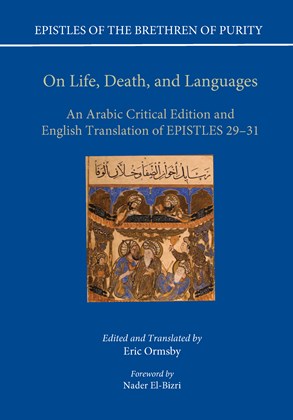On Life, Death, and Languages An Arabic Critical Edition and English Translation of Epistles 29–31
Oxford University Press in association with the Institute of Ismaili Studies
The Ikhwān al-Ṣafāʾ (Brethren of Purity), the anonymous adepts of a tenth-century esoteric fraternity based in Basra and Baghdad, hold an eminent position in the history of science and philosophy in Islam due to the wide reception and assimilation of their monumental encyclopaedia, the Rasāʾil Ikhwān al-Ṣafāʾ (Epistles of the Brethren of Purity). This compendium contains fifty-two epistles offering synoptic accounts of the classical sciences and philosophies of the age; divided into four classificatory parts, it treats themes in mathematics, logic, natural philosophy, psychology, metaphysics, and theology, in addition to didactic fables.
The three epistles in this volume are among the most accessible and appealing of the Brethren of Purity’s treatises. In their down-to-earth yet elegant style, they present age-old teachings on three fundamental issues: the nature of death, and what this means for body and soul; the truth about pleasure and pain, both physical and spiritual; and the multiplicity of human languages and their origins, beginning with a discussion of natural and mechanical sounds and proceeding to human speech. Rich with metaphors and illustrative parables, here we find outstanding examples of adab in the Arabic literary tradition, refined and genial philosophical discourses that reveal a high degree of sophistication and considerable literary flair.
Foreword, Nader El-Bizri
Technical Introduction
Introduction
Epistle 29
Epistle 30
Epistle 31
Bibliography
Subject Index
Index Locorum
Arabic Part
Risāla 29
Risāla 30
Risāla 31
Index of Qurʾānic quotations
Eric Ormsby is a distinguished scholar of Islamic thought, as well as being a translator and poet. He received his PhD in Islamic Theology and Philosophy from Princeton University and studied Semitic Philology at the University of Tübingen, and Library Science at Rutgers University. He was the Director of Libraries at the Catholic University of America, and then also at McGill University, where he was later appointed as full Professor and Director of the Institute of Islamic Studies. He was Chief Librarian at the Institute of Ismaili Studies, and then Deputy Head of its Department of Academic Research and Publications until 2013. He has published widely on Islamic theology and mysticism, including Theodicy in Islamic Thought (1984), Handlist of Arabic Manuscripts (1987), Moses Maimonides and His Time (1987), and Ghazali (2007). His poetry has been published in magazines such as The New Yorker and The Paris Review, and he is the author of seven collections of poems as well as two books of essays on poetry and literature. His annotated translation of Goethe’s West-Eastern Divan was published in London in 2019.

